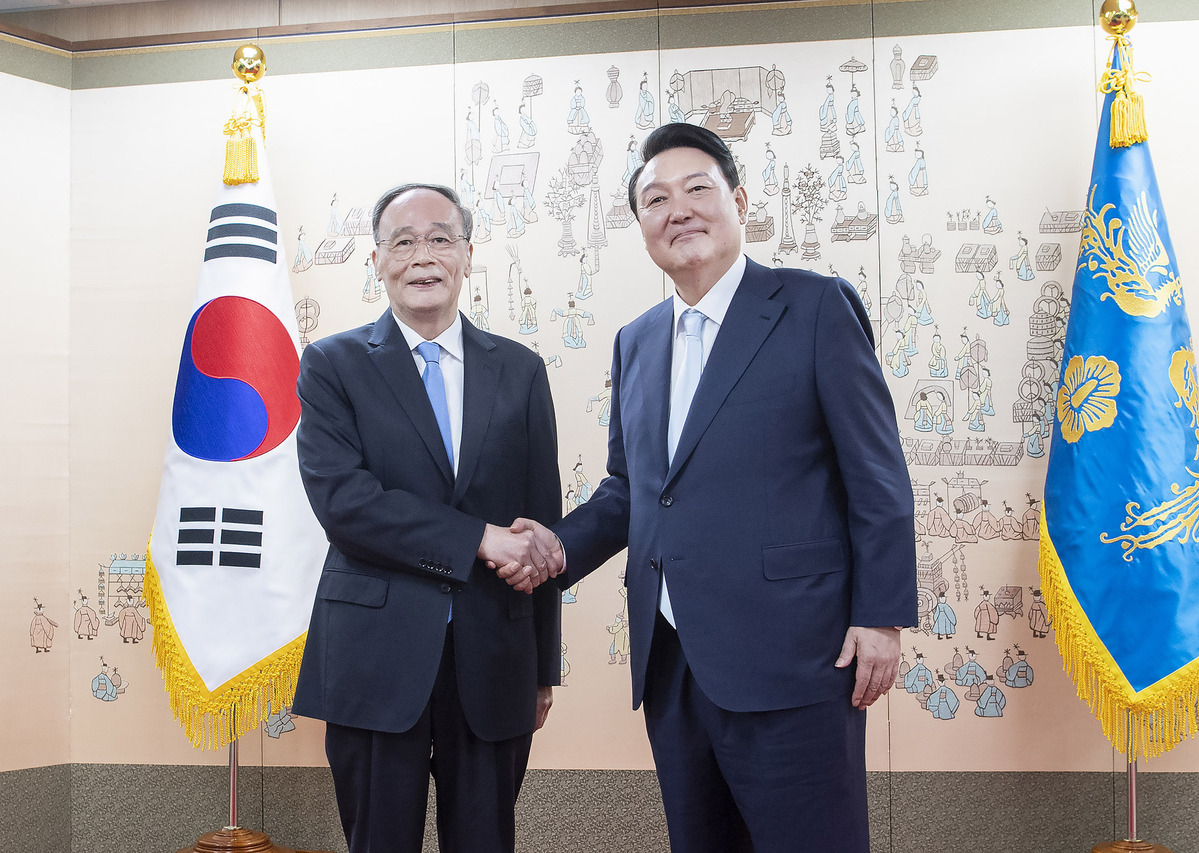
Vice-President Wang Qishan (L) shakes hand with the ROK's new President Yoon Sukyeol in Seoul on May 10, 2022. [Photo/Xinhua]
This is an editorial from China Daily.
Demonstrating Beijing's sincere wish to sustain good-neighborly relations, Chinese Vice-President Wang Qishan attended the inauguration ceremony of Yoon Suk-yeol, the new president of the Republic of Korea, as a special envoy of President Xi Jinping on Tuesday.
Sending a person of such prominence on such a ceremonial mission highlights the importance Beijing attaches to China-ROK relations.
Comparing notes with a new government when it takes office is important in any diplomatic relationship. It clears the ground for smooth communication and is thus conducive to avoiding misgivings. Particularly so now.
To Beijing and to Seoul, as they are for all other members of the East and Northeast Asian neighborhood, perhaps more than ever before, a sane mind and strategic insight are of critical significance in this time of turbulence and uncertainties.
As the clouds of Cold War-style confrontation gather over the battlefields in Ukraine and threaten to spread further, the global geopolitical landscape is becoming increasingly volatile. Northeast Asia is also feeling the tremors.
Japan is hosting a summit meeting with European Union officials, which, themed on closer Japan-EU cooperation, is widely expected to both invite greater EU involvement in the Asia-Pacific and deepen the emerging divide between countries in the region.
The United States is hosting a summit meeting with the Association of Southeast Asian Nations in Washington, which, with the White House reiterating its desire to participate further in regional affairs, is certainly intended to disrupt regional cooperation with China, the economic powerhouse in the Asia-Pacific.
Such moves, and the attempts to portray Beijing as a threat to the regional and global order, threaten to undermine the peace, stability and prosperity the region has managed to secure over the past decades.
As Wang said to outgoing ROK President Moon Jae-in on Monday, "no matter how international and regional situations change, the fundamentals of friendly cooperation between China and the ROK will and must not change". Which is an important lesson from the history of the countries' relations.
Since diplomatic relations were established 30 years ago, pragmatic cooperation has brought tremendous benefits to both countries and their people. The two deeply integrated economies displayed impressive resilience and potential against the backdrop of global headwinds last year. The "extensive common interests" as Wang put them are not empty talk, but are tangible gains for both sides rooted deeply in solid trade growth figures.
The calls from outside the region for "decoupling" and "rebuilding supply chains", which have grown louder lately, are ideologically driven, and show both a marked ignorance about the facts on the ground and a condescending disregard for the interests of local stakeholders.

 中文
中文





